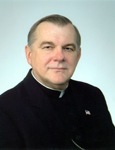By Archbishop Thomas Wenski - The Archdiocese of Miami
Archbishop Thomas Wenski preached the following homily Aug. 29, 2012, during a Mass with catechetical leaders - parish directors and coordinators of religious education - who were gathered for a professional day at St. Martha in Miami Shores.
If anything, this �Year of Faith� should inspire a greater appreciation of what you all do and the challenges you face. Sometimes you are called DREs, directors of religious education; but, in fact, you are charged with something a bit more specific and perhaps more daunting: that of formation in the faith.

Archbishop Thomas Wenski
Certainly all of you engaged in catechesis are acutely aware of the challenges that confront us in the transmission of the faith � and of the need for a New Evangelization. This New Evangelization is not, as the popes since Vatican II remind us, �new� in its content for Christ is the same, yesterday, today and forever. But facing the real changes that have occurred in our culture � changes that make making an Act of Faith perhaps more difficult � we do need new methods and new zeal.
We live in an increasingly secularized world, where belief is reduced to the subjective � a matter of one�s private opinion and where God really doesn�t matter much. We live at a time when many people will define themselves as �spiritual� but �not religious� and thus construct for themselves �made to order� creeds in which they profess to believe in Jesus (expressed sometimes very vaguely) but not in the Church. Thus, we find people who say they believe but they do not belong; and, as we see sometimes in many Catholics in public life (but not exclusively among them), we find those who belong but who do not apparently believe.
We are constantly looking for new programs for our faith formation classes � but as Blessed John Paul II reminds us in Novo Milenio Ineunte, we are not saved by programs but by a person � namely Jesus Christ. But the challenge is how do we present the Gospel, the good news of Jesus Christ, as a great life affirming �Yes� when so many people see it as a big bunch of �Nos�? How to we present it with excitement when most people give the impression of being �tired� of the demands of Christian commitment? If the catechetical project is to succeed, we do need to rediscover the �joy of believing� and a new �enthusiasm for communicating the faith.�
And so, do we need a �Year of Faith�? You betcha � and while we should not expect to find some magic formula that will solve all our difficulties in transmitting the faith effectively to a new generation of believers, hopefully the Year of Faith will assist us and the Church at large to help people who are searching for God to open the �door to Faith.�
St. Paul�s words today to the Thessalonians challenge us all. He writes: �We want to present ourselves to you as a model for you�so that you might imitate us.� Faith grows when it is lived.
As Pope Paul VI reminded us in what should be considered his pastoral testament, Evangelium Nuntiandi, today people do not listen to �authorities� anymore but to �witnesses�. If people listen to us � it won�t be because we wear a collar or have a sheepskin hanging on our walls; they�ll listen only to the extent that we are witnesses.
Today�s liturgy celebrates the Passion of John the Baptist, the precursor or forerunner of Jesus. The manner of John�s martyrdom foreshadows what will befall Jesus himself. Mark in his Gospel has been recounting how Jesus and even his disciples were curing almost every type of disease � and then all of a sudden he presents us with John the Baptist�s martyrdom. The Servant of God suffers imprisonment and death because he is a servant of God. The point that Mark wants to make, it seems, is that following Jesus does not always bring health and happiness. There can be times of suffering for believers � and even times when believers are put to death. But faith grows when it is lived.
And here is precisely why we honor the passion of John through which he finds true beatitude. Picture John sitting in prison awaiting his fate � certainly it had to be a time of darkness for him. Perhaps his imprisonment was an experience of what spiritual writers call the �dark night of the soul,� when one must trust in God and in his love despite all apparent evidence to the contrary. Too often our faith � or our level of commitment to our faith � depends on our demands for clarity.
John trusted in God even in the darkness and uncertainties of his imprisonment. One of John�s significant sayings is the words he spoke to his own disciples whom he sent to Jesus: �He must increase, but I must decrease.� It is in his letting go of self in order to embrace God that John shows to us the path of faith. It is that surrender of self that allows us to respond to John�s message of �metanoia�, that change of heart and mentality that permits us �to recognize God even in the night in which all earthy things exist.� (Pope Benedict XVI � Dogma and Preaching).
May this Year arouse in each one of us and in every believer the aspiration to profess the faith in fullness and with renewed conviction, with confidence and hope. At the same time, let us pray that our witness of life may grow in credibility.
To rediscover the content of the faith that is professed, celebrated, lived and prayed. and to reflect on the act of faith, is a task that each one of us must make his own, especially in the course of this Year of Faith.


Comments from readers